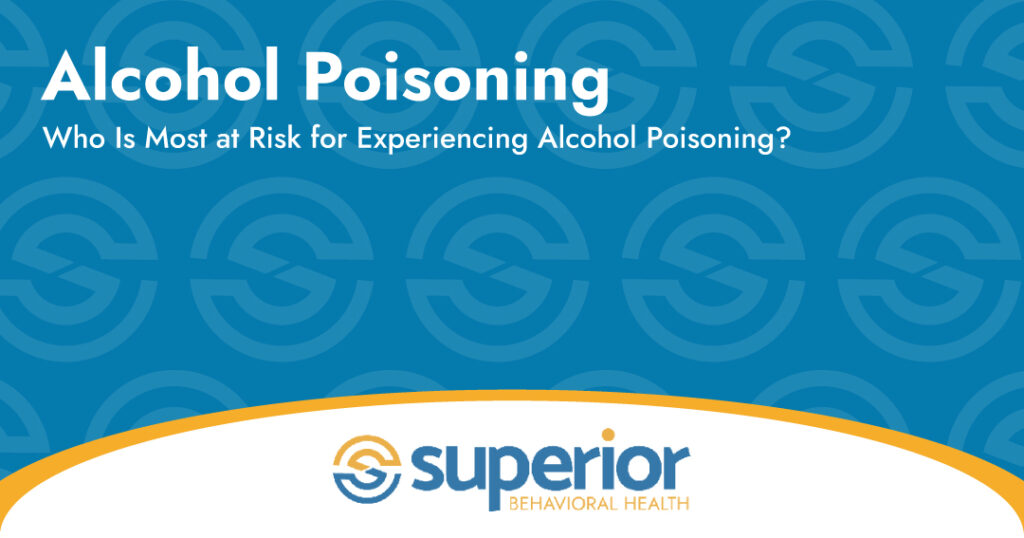Do you ever remember, or not remember, a time when you drank so much that you forgot everything from the night before? Maybe in college, you went to frat parties and couldn’t recall much of what happened when you came to the next morning. Perhaps you went to a friend’s house in high school and the two of you chugged a bottle you found in their parent’s basement. There are times when alcohol levels can become dangerously high in the body, leading to side effects that can be deadly. This is known as alcohol poisoning.
While many people know the risks of overdosing on drugs, not many people talk about the reality of alcohol poisoning. Here at Superior Behavioral Health, we believe in spreading awareness about alcoholism and heavy alcohol use. Today we’re going to answer the question – what exactly is alcohol poisoning and how does it work?
Who Is Most at Risk for Experiencing Alcohol Poisoning?
Alcohol poisoning occurs when the body has too much alcohol within it. The liver can only process so much alcohol at once, usually around 1 drink every hour. When you consume more than your liver can process it overflows into other parts of the body. Since alcohol is a toxin, this can eventually become dangerous.
Nearly 1/5th of Ohio’s population reported binge drinking within the past 30 days. The more alcohol you consume, the higher your chances of experiencing alcohol poisoning. Those who binge drink, especially on a regular basis, are at the highest risk.
When Does Alcohol Poisoning Occur?
While there isn’t a specific number of drinks that guarantees alcohol poisoning, it does occur with heavy, or binge drinking. Binge drinking is classified as having 4-5 drinks in the span of a couple of hours. One drink can consist of 12 ounces of beer, 8 ounces of malt liquor, 5 ounces of wine, or 1.5 ounces of distilled spirits as defined by the CDC.
A person’s metabolism, what they ate or drank recently, other substances in their body, their health, and history with alcohol use can all influence the number of drinks it takes to experience alcohol poisoning.

What Happens to Your Body When You Have Alcohol Poisoning?
When your blood alcohol content reaches a high number, usually around .25% or higher, it can start to negatively impact your brain. Alcohol is a toxin and can cause your brain to cease being able to control important functions such as breathing or making your heart beat. This is what would be known as alcohol poisoning.
How Alcohol Poisoning Affects the Brain and Vital Organs
In order to protect itself from further toxins, parts of your body can start to shut down when your BAC reaches a certain level. Even if you pass out due to alcohol poisoning, your BAC can still rise as alcohol is being filtered through your system.
Depending on the severity of the poisoning, vital organs and long-term brain damage can occur, especially if action isn’t taken to help the person.
Other Symptoms of Alcohol Poisoning
The most common symptoms of alcohol poisoning include:
- Vomiting
- Unconsciousness
- Confusion
- Slurred speech
- Seizures
- Blue tinted skin
- Irregular breathing
- Unresponsiveness

When Should You Seek Medical Attention for Alcohol Poisoning?
If you notice any of the signs of alcohol poisoning, you should seek medical attention. Things like coffee, cold showers, or just “sleeping it off” do not work and can lead to life-threatening situations. Even if you are underage, calling for help is important.
If a person is showing the signs of alcohol poisoning, help them into a recovery position. This means lying them on their side, normally with their knees bent. Make sure someone keeps an eye on them until help arrives.
If they have a seizure during your wait, do not try to hold them down. If possible, put something like a jacket or small pillow under their head to help them not hurt themselves. Move objects away from the person that they could hurt themselves on. Time the seizure and inform medical help how long it was and if multiple happened.
If you want to start your recovery journey from alcohol use, Superior Behavioral Health is here to help. With same-day appointments and medicaid options available, we want to work with you to help you get access to the care you deserve. Give us a call today at 216-435-1110 and we’ll get you started.
FAQs
How do you act when you have alcohol poisoning?
Common symptoms include confusion, vomiting, unconsciousness, slowed breathing, and seizures.
How do I know if someone is drunk or has alcohol poisoning?
If a person starts to act confused, or disoriented, their complexion starts to pale, or they pass out – they might have alcohol poisoning.
What to do if you drink too much alcohol?
If you’re experiencing the side effects of alcohol poisoning, you should call for medical help. Things like cold showers and coffee do not work to reverse the effects of alcohol poisoning.


